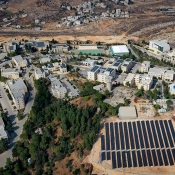Dr. Jon Anderson lectures at Birzeit - Overview of Internet in the Arab World
Dr. Jon Anderson, Associate Professor of Anthropology at the Catholic University of America, Washington, DC, and editor of the Middle East Studies Association Bulletin, the journal of review of the Middle East Studies Association of North America today gave a lecture at Birzeit University about the Internet in the Arab World.
The visit was organised by the Palestinian Information Technology Special Interest Group and sponsored by USIS, an aid wing of the American government.
Anderson (right) spoke about the Internet as a physical network; a collection of programmes, both software and protocols; a social organisation; and a culture, characterised by free speech, open access and decentralisation. "The most common form of censorship in the Arab World," stated Anderson, "is self censorship. The Internet has penetrated the Middle East in a commercial guise." Anderson cited the examples of commercial websites such as Arab.Net and Arabia Online, which are characterised by a highly professional design, the interests of trading organisations and a desire to reach an international audience.
As an anthropologist, Anderson's focus is very much on how the Internet has impacted Arab society, and vice versa. "Only Syria, Iraq and Libya are not on the Internet," he said, "and this is for entirely political reasons. For the rest, the fear of the unknown has been bypassed by commerce." In Jordan, Anderson noted, 500 new jobs have been created in the Interent sector over the last 2 years. He emphasised the importance of an independent phone company, something unique to Jordan in the Arab World, but pointed out that the Internet is still expensive there, due to a lack of competition.
The audience comprised largely of IT professionals working in Palestine. Director of Birzeit's Computer Center, Marwan Tarazi (left) who introduced the lecture, commented, "It was encouraging to know that those of us involved with IT in our corner of the Arab World are not following a path bound solely by commercial interests. Palestinian IT professionals are concerned that the Internet here is also used to address the political, social and cultural aspects of life."
Earlier Anderson and USIS's Duncan MacInnes met with Birzeit Webmaster Nigel Parry to discuss the university's progress on the Web. "Tomorrow, it will be exactly one year since the university launched its website," Parry told them, "During that time we had over 47,000 visits and over a million files requested from our webserver." A special report is now available on the Birzeit University website.






